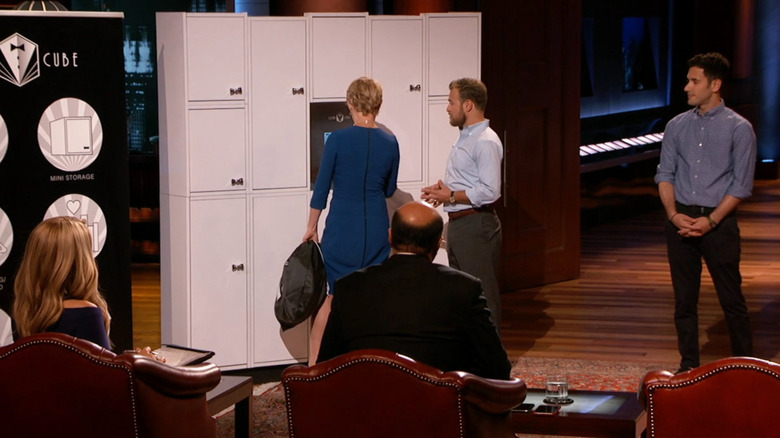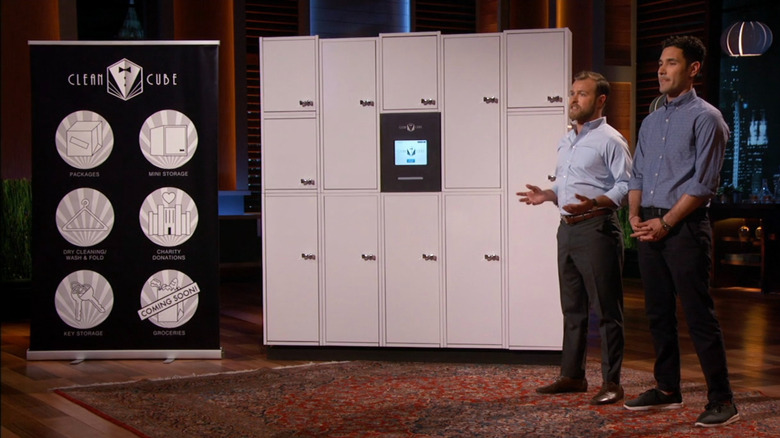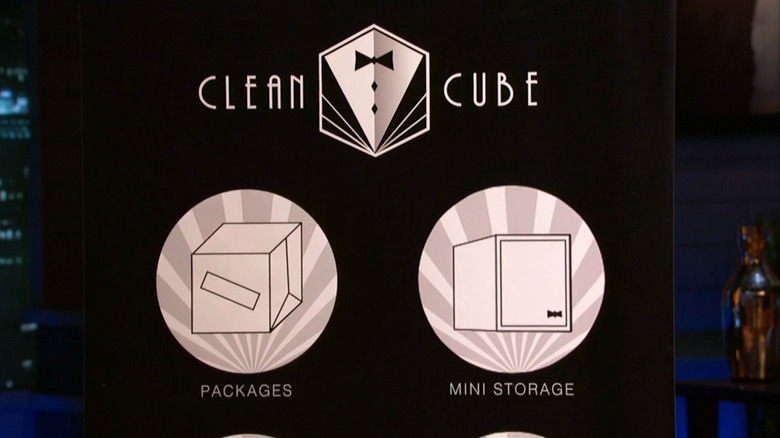What Happened To Clean Cube On Shark Tank Season 7?
"Shark Tank" Season 7 saw more than its fair share of tech pitches take the stage, ranging from hit fitness apps to clothing customization programs to specialized camera equipment providers. One that certainly seemed to stand out from the crowd was Clean Cube, an automated residential locker service created by entrepreneurs Arthur Shmulevsky and Ryan Agran.
The idea is simple. The machine can be accessed any time of the day, with a variety of services offered including dry cleaning, package delivery, clothing donations, and mini storage. Users create a specialized code to access their locker, and Clean Cube's drivers are notified when something is ready for a pickup. The company charges $5 per bag per month for mini storage, $3 a package for delivery, and free clothing drops. The technology is easy to use for apartment dwellers while adding to the value and appeal of any given property. Finding it difficult to make time to drop off or pick up laundry from the dry cleaners during his hectic work schedule, co-founder Shmulevsky, came up with the Clean Cube as a more efficient alternative to similar app-based services, envisioning the tech as the way of the future.
Clean Cube's "Shark Tank" appearance started off with some promise, as the team successfully demonstrated how easy the technology was to use, along with its potential applications. However, the Sharks didn't see much of a future for the company, resulting in the Clean Cube team leaving empty-handed.
What happened to Clean Cube on Shark Tank?
The Clean Cube co-founders sought to get a $300,000 investment for a 10% equity stake. To demonstrate their technology, the team brought over a working unit from one of their locations and had Barbara Corcoran demonstrate how easy and quick it was to perform drop-offs and pick-ups. By this point, 40 residential buildings in New York City employed the system, ranging from 10 to 168 storage units in use at these locations.
The team was only making money on their individual services, including $3,000 on average for installation and various fees for pick-ups and storage. Through this model, the company had raked in $130,000, with $65,000 alone coming in from the past three months. Their eventual plan, along with charging users a $10 subscription access fee, was to move beyond residential locations and install machines in other public spaces such as convenience stores, laundromats, and subways.
While Clean Cube had shown promising growth, it wasn't enough to excite the sharks. Some investors such as Lori Greiner, Mark Cuban, and Barbara Corcoran largely failed to see how the business could be scaled and taken to the next level. Robert Herjavec and Kevin O'Leary brought up similar concerns regarding the logistics of negotiating with businesses and public spaces to give up that such a significant amount of floor space, as well as the time consumed by the installation process.
Clean Cube after Shark Tank
While Clean Cube's efforts in the tank proved to be a disappointing venture, the duo behind the innovative service remained optimistic that they would find success elsewhere. Following their pitch, co-founder Ryan Agran shared at the end of the show, "It would have been great to have partnerships with, you know Mark or Barbara, and, you know, grow this business the way we see it and how we want it, and it would have shot us out of the barrel, but you know we'll do it on our own."
The team certainly had high ambitions, as co-founder Arthur Shmulevsky shared in a 2014 interview with IL Startups NYC that they planned to be in 1,000 buildings within four years, aiming to have a 2-3% market share. But even without a Shark, the team could count on their appearance on the show to drum up interest. Oftentimes, after an episode airs, a business will experience what is known as the "Shark Tank" effect, where a company sees a significant boost in sales and online traffic from interested viewers. However, following the debut of its "Tank" segment on October 30, 2015, it doesn't appear that Clean Cube experienced such a surge.
The company seemingly did no marketing for its episode, judging from its remaining social media channels. Likewise, there are no existing interviews with either co-founder about their time on the show, further diminishing their chances of building a newfound audience. Whether due to underestimating the power of this marketing technique or a lack of faith after failing to strike a deal, the team ultimately missed out on taking advantage of this lucrative but short-lived opportunity.
Why did Clean Cube go out of business?
Perhaps unsurprisingly, Clean Cube didn't sport the longest lifespan after its time on "Shark Tank." Determining the exact time of the company's closure is a little difficult, as its co-founders's LinkedIn accounts state different end dates, but it's safe to say that Clean Cube ceased operations some time between late 2015 and early 2016. As of this writing, its website has gone down and its Facebook and Instagram accounts are similarly inactive.
This is one of those instances where pinpointing an exact reason for the company's demise is unclear. However, it's easy to imagine that the team may have underestimated what it would take to fully scale the venture, especially with competition arising from more versatile services such as Amazon Lockers. Viewers who tuned in to Clean Cube's "Shark Tank" appearance didn't hesitate to point this out, but also questioned the merits of the service itself.
On a Reddit thread posted shortly after the episode's airing, some fans such as u/Catpaws25 responded to the service more positively, commenting, "I live in a city where no one has concierges, a city of 1.5M and literally 1 condo building in the city has a doorman. This would be an amazing service for me." However, a majority criticized various aspects, ranging from the clunky interface to the logistics of the locker setup. Others also pointed out the irony of the "Clean" Cube being positioned in New York City, with one user saying, "Yah and let's stick one in every subways station! We can take bets on how long it will take for each one to be used as a urinal."
What's next for Clean Cube's founders?
It's obvious that the team behind the Clean Cube came into the endeavor with good intentions by helping make the hustle and bustle of city life a little less hectic. With a better strategy to compete and some stronger marketing efforts, it's possible that Clean Cube could have carved itself a solid place within the market. But while we may not know what Clean Cube could have been, we do know what its co-founders have gone on to lead successful careers elsewhere.
Arguably the main driving force of Clean Cube, Arthur Shmulevsky has transferred his enthusiasm and skill to a number of fruitful ventures in the years since. His next big endeavor was working for in general management roles for the hospitality service Sonder Inc., an app that helps individuals and businesses find ideal hotel rooms that suit their needs. Shmulevsky worked with the company for a little over three years, leaving in May 2020 to become a consultant and eventual Chief Operating Officer at Texas-based accounting firm FinOptimal. Since 2022, he has been the Head of Operations and Strategy for Home0001, a housing collective guided by modern artist and designers.
Following his time with Clean Cube, Ryan Agran spent seven years at Latch, working his way up from being a manager to Head of Channel Vice President. The company seemed a natural progression for Agran's skill set, as Latch specializes in smart security solutions for residential communities and their property. His most recent venture has been for Amazon, where he works as Senior Ops Manager.




